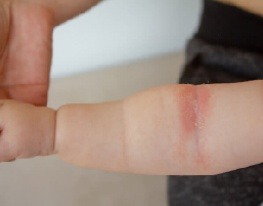About Us

Atopic Dermatitis
Atopic Dermatitis is also known as Atopic Eczema or Childhood Eczema. It affects about 3% of all children. It is more common in children born to families with asthma, hay fever, spring catarrh and eczema. Hence, although it is not a hereditary disease, familial incidence is significant. Dry and irritable skin with severe and easily triggered itching is the outstanding feature of this disease. Your child is likely to have intermittent exacerbations, often under physical, environmental or emotional stress. 30-50% of all atopic children will eventually get better as they enter adolescence.
Some will continue to have residual eyelid eczema or hand eczema as adults. A fraction of these children will continue to have on and off eczema throughout their life. Even among the latter, the periodic episodes will become less frequent and less severe. It is important to remember that your child’s skin has an overactive immune system, because of which he/she is sensitive to a large number of irritants in our environment, to which other children do not react.
Here a few guidelines which will help you care for your atopic child
- Extremes in temperature and excessive sweating will irritate your child's skin. The child's environment must be kept at a constant temperature. Bathe your child in lukewarm water and discourage your child from having long or frequent baths. Pour a cap full of soothing unscented bath oils to the child's bath tub before you fill it with water. Do not apply the bath oils directly to the skin. Bathe the child with liquid cleansers. They do not foam, but you can be assured that they will effectively clean the skin. After bathing, pat the skin dry. Do not rub.
- Moisturizers and medicated creams must be applied within 3 minutes of drying the skin. So carry them with you to the bath.
- Use the medicated cream to the red rough itchy and scaly areas, as prescribed. The bland/moisturizing creams can be applied to the rest of the body, and this can be repeated 2-3 times in a day
- The child should get dressed in the bathroom itself. Before opening the door, make sure that the fan or air conditioner is switched off, so that there is no sudden fall in the skin temperature
- Avoid using powders, scented soaps or scented creams on your child
- Avoid using herbal oils or massage oils
- If your child has severe uncontrolled eczema and you live in a hot, dry and arid state, or a state with long and severe winters, you may have to seriously consider moving to a more tropical city with high environmental humidity.
- Stay away from animals and pets.
Clothing
Woolen, synthetic, denim and acrylic fibers will irritate the skin of your child. Use cotton clothing or satin pajamas at night. Do not use fabric which leach colors/dyes to your child’s skin. Use cotton garments under woolens during winters. In case of suspected pollen allergy, wash clothes after each use, especially if they have been worn outdoors. Dry your child’s clothes indoors.
Food and Diet
Certain high protein food items can exacerbate Eczema. These include milk and milk products, meat, seafood, eggs, soya and nuts. Preserved food and food with artificial additives and colorants are also part of this list. This does not mean your child is allergic to all these foods. Maintain a food dairy and eliminate one item from your child’s diet at a time, till you can positively identify the offending food item (the one that exacerbates the Eczema on two or more occasions). Eliminate this from the diet. The same agent can be reintroduced after a year or so, and if it is well-tolerated, may be continued.
If your first child has eczema, remember to breast-feed your subsequent children till the age of two.
Food avoidance is always the last resort with growing children. Allergic testing is done to confirm the food allergy, before said food is eliminated from the diet.
Environment
House dust mite is a known culprit. Eliminate dust from your surroundings. Remember to vacuum carpets, curtains, upholstery and shelves at periodic intervals. Keep the bed sheets covered with a bedspread or counterpane, which should be removed prior to use. The counterpane should be dusted and washed at least once weekly.
Most importantly, your child’s emotional stability is crucial. “Atopic personalities” have above average intelligence but are shy and high-strung, and sometimes have difficult relationships with their mothers. Optimistic and reassuring parents can make a world of difference.

